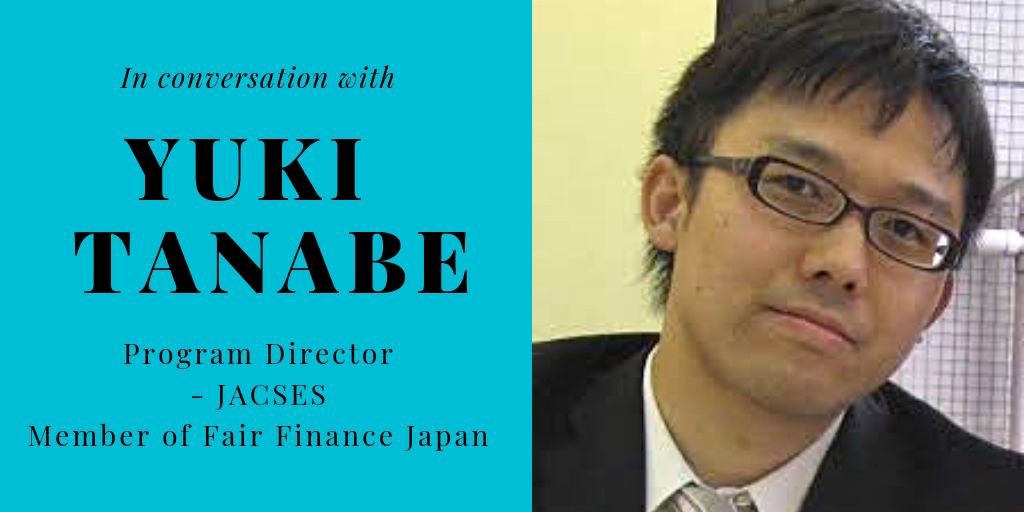
G20 leaders gathered in Osaka this week as Japan hosted its first ever G20 Summit.
G20 leaders gathered in Osaka this week as Japan hosted its first ever G20 Summit. Though a host of issues were discussed during the year round meetings that took place throughout Japan in 2019, the central theme of “strong, sustainable, balanced and inclusive growth” was considered as the core mission of the G20 this year.
In this conversation with Yuki Tanabe, we try to understand and analyse how far the Japan G20 was able to take the agenda of inclusive development forward, and what are the next steps towards implementing socially and environmentally sustainable finance.
Mr. Tanabe is a leading voice on sustainable and responsible finance in Japan. He is the Program Director for Japan Center for a Sustainable Environment and Society (JACSES). He has been working with JACSES since 2003, and resolutely works towards ensuring that social and environmental factors are fully into account in the decision making processes of financial institutions, and strengthening the role of civil society in fostering sustainable finance. JACSES is the lead partner of Fair Finance in Japan.
It was our pleasure to have interviewed him… So, let’s get started!
FFA: In your view, do you think the G20 2019 has been able to deliver on the goal of ‘strong, sustainable, balanced and inclusive growth’?
YT: The concept of ‘strong, sustainable, balanced and inclusive growth’ as the core mission of the G20 is appreciated by all of us. Globally, Japan has been appreciated in showing its leadership in overcoming major SDGs challenges in the G20 summit. This is especially in regard to the scope of ‘quality infrastructure’ and the endorsement by the G20 Finance Ministers and Central Bank Governors in their June Communique’ of the G20 Principles of Quality Infrastructure Investment as a common strategic direction. Unfortunately, where the Japan G20 fell short was in its weak statement on climate action. Since there is a gap on this issue between the other 19 countries and the USA, Japan’s stance on the same is not as strong as needed. Strong action on climate change is an absolute must to achieve sustainability, Japan needs to have strong policy commitments on climate change. The G20 financing for infrastructure should be in line with the goal of Paris Agreement, and G20 should end their public financing for new coal-fired power development as the first step.
FFA: What are your main asks from the Government as a part of the “NO COAL JAPAN” campaign?
YT: JACSES has done a number of research on coal financing; and our research has highlighted that even post the Paris agreement, Japan is still funding a number of coal-fired power plants. JACSES is a part of the No Coal Japan Campaign, and along with other civil society organization, we urge the Japanese Government in leading the way by immediately ending their support for coal financing. It is critical that a shift to renewable energy is done, and done quickly. This is important even for the economic feasibility of Japan.
FFA: Given that the Civil 20 (C20) was held as prelude to the G20, what was the achievement therein?
YT: Basically, the civil society in Japan has been engaging with the Government for nearly 20 years. Due to this intensive communication, Japan’s Ministry of Finance is aware of the social and environmental challenges being faced by the marginalized communities due to business activities. Therefore, the June 2019 Communique’ of the G20 Finance Ministers and Central bank Governors Meeting has social and environmental principles underlined as its key components, which is a big victory for the civil society, especially the Japanese civil society.
FFA: Where do you see Fair Finance Asia’s role in taking the agenda of inclusive development and sustainable finance forward?
YT: The June 2019 Communique’ are mainly principles, and it is imperative that these principles are implemented. Civil society, along with Fair Finance Asia and Fair Finance in the different countries need to advocate with their Governments and regulators to ensure that the G20 political commitments are translated into actions. The coalition of civil society organizations within the Fair Finance movement should ensure that financial regulators, commercial banks and other financial institutions are held accountable for ensuring sustainable business practices that strengthen responsible lending and financial investments. The Japan G20 2019 showcased how different Fair Finance countries can come together to create a viable working group, and such joint initiatives should be encouraged.
FFA: As part of FFA, what else do you hope to achieve within the G20 this year and the years to come?
YT: India will host the G20 in 2022, and that will be a further opportunity for us to engage in building the G20 agenda. Also, G20 is one of the platforms, there are many other stakeholders that we as an Asian coalition need to engage with to build an enabling environment for sustainable finance in Asia.
We hope you enjoyed our interview with Yuki as much as we did!
Fair Finance Asia (FFA) is a network of civil society organizations working in Asia to ensure that financial institutions in the region give due considerations to the Environmental, Social and Governance (ESG) criteria in their business activities and investment decisions. Seven countries within the region are a part of the FFA: Cambodia, Japan, India, Indonesia, The Philippines, Thailand and Vietnam. Read more about us on Twitter @FairFinanceAsia